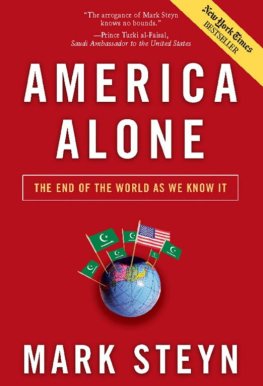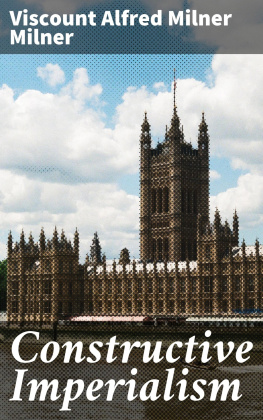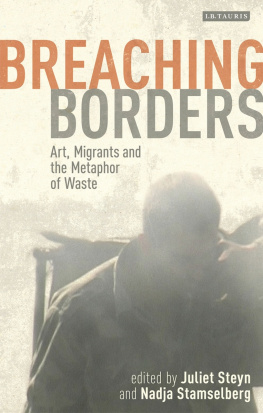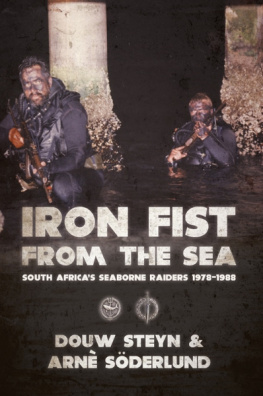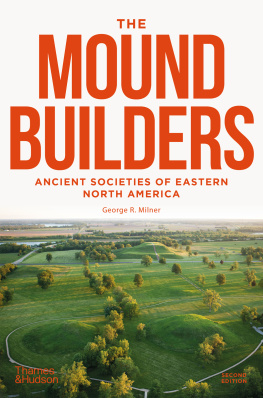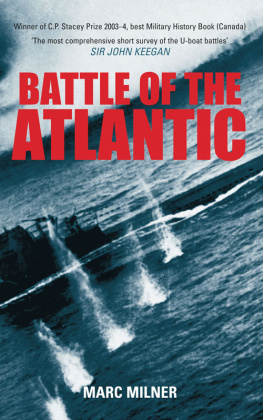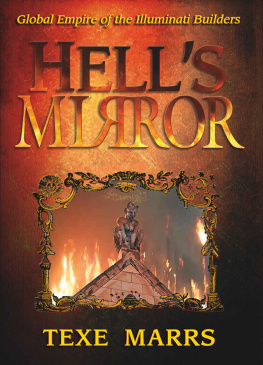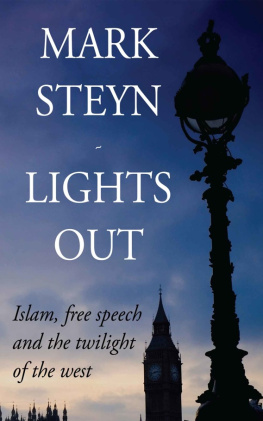Richard Steyn - Milner: Last of the Empire Builders
Here you can read online Richard Steyn - Milner: Last of the Empire Builders full text of the book (entire story) in english for free. Download pdf and epub, get meaning, cover and reviews about this ebook. genre: Non-fiction. Description of the work, (preface) as well as reviews are available. Best literature library LitArk.com created for fans of good reading and offers a wide selection of genres:
Romance novel
Science fiction
Adventure
Detective
Science
History
Home and family
Prose
Art
Politics
Computer
Non-fiction
Religion
Business
Children
Humor
Choose a favorite category and find really read worthwhile books. Enjoy immersion in the world of imagination, feel the emotions of the characters or learn something new for yourself, make an fascinating discovery.

- Book:Milner: Last of the Empire Builders
- Author:
- Genre:
- Rating:3 / 5
- Favourites:Add to favourites
- Your mark:
- 60
- 1
- 2
- 3
- 4
- 5
Milner: Last of the Empire Builders: summary, description and annotation
We offer to read an annotation, description, summary or preface (depends on what the author of the book "Milner: Last of the Empire Builders" wrote himself). If you haven't found the necessary information about the book — write in the comments, we will try to find it.
Milner: Last of the Empire Builders — read online for free the complete book (whole text) full work
Below is the text of the book, divided by pages. System saving the place of the last page read, allows you to conveniently read the book "Milner: Last of the Empire Builders" online for free, without having to search again every time where you left off. Put a bookmark, and you can go to the page where you finished reading at any time.
Font size:
Interval:
Bookmark:
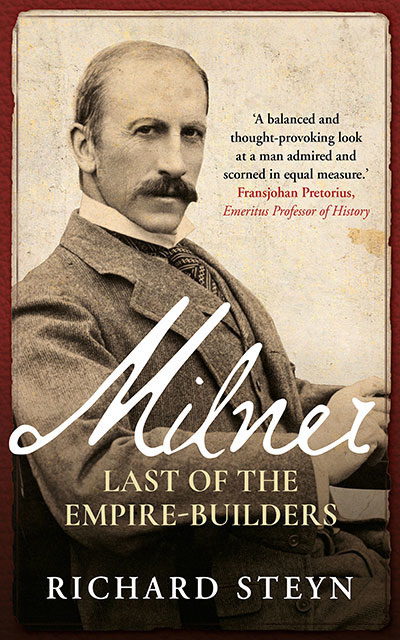
LAST OF THE EMPIRE-BUILDERS
Richard Steyn
JONATHAN BALL PUBLISHERS
JOHANNESBURG CAPE TOWN LONDON
To my brother, Christopher, for his unstinting support
And in memory of Gordon Forbes and Jonathan Ball
Most of the world since civilisation began has lived under empires.
Deepak Lal, Indian economist
The most illuminating history is often written to show how people acted in the expectation of a future that never happened.
Roy Foster, Irish historian
Imperialism was more than a set of economic, political and military phenomena. It was a habit of mind, a dominant idea in the era of European world supremacy which had widespread intellectual, cultural and technical expressions.
John M MacKenzie, British historian
Thousands of people will immediately stream into the Transvaal and the balance of political power which even now is clearly ours in the whole of South Africa under a system of equal rights will turn quickly and decisively against the Boers for all time.
Sir Alfred Milner, 1899
I was born 84 years ago into a world that was a universe away from where we are today We were passionately committed to the resurrection of the Afrikaner nation. The memories of the Anglo-Boer War were still raw and painful. During that war our people were the victims of a crime against humanity in the course of which we lost almost ten per cent of our population most of whom were women and children who died in British concentration camps. We remembered with bitterness Lord Milners attempts to deprive us of our language and culture.
FW de Klerk, former State President of South Africa, 2021
It is hardly possible for any homegrown South African to write a dispassionate account of the life of Alfred, Lord Milner. As the principal instigator of the Anglo-Boer (or South African) War of 18991902, Milner provoked a conflict whose consequences are still felt a century and more later. The British journalist Leo Amery, general editor of a seven-volume history of the war for The Times of London, admitted that absolute impartiality in dealing with its origins was probably unachievable. His own account, he confessed, had been written frankly from the point of view of one who is convinced that the essential right and justice of the controversy have been with his own country. I admit equally frankly to believing the justice of the argument to lie on the other side, though my aim in this book is neither to vilify nor justify Milner but rather to explain what I believe motivated this enigmatic and driven individual, whose actions have so influenced the lives of every South African.
As the incomparable historian CW de Kiewiet reminds us, those who write about this seminal time in South Africas history often pay insufficient heed to the complexity of events and the motivations of the participants. The picture of the capitalists as men with gold in their hands, brass in their tongues, contempt in their faces, and treachery in their hearts, he noted, is as untrue as the picture of an Empire robbing a petty state of its independence out of envy for its wealth, or the picture of an ignorant and perverse old man leading his state into destruction rather than yield to a modern age. I have tried to bear this admonition in mind.
Milner, of course, was not solely responsible for bringing about a conflict that several others helped foment. Britains Colonial Secretary, the duplicitous Joseph Chamberlain, ran him a close second, and there were firebrands in Krugers ranks as well who were spoiling for a fight. Yet Milner wanted a war more than anyone else, and, as was the case with many men of superior intellect, he acted from what he believed were the highest motives. Like Chamberlain, he convinced himself that it was not only Anglo-Saxons who would profit from the Empire but the backward peoples of the world also as the beneficiaries of being ruled by the greatest of all the governing races. The governed, it should be added, were generally less enthusiastic.
Like his predecessor, Sir Bartle Frere, almost two decades earlier, Milner knew virtually nothing about South Africa before coming here, soon after the Jameson Raid. Although he learnt the rudiments of the Dutch language, he made no sustained effort to understand the feelings of Boer-Afrikaners, pursued results far too quickly and was prepared to use the necessary force to achieve them. As the historian of Empire, Piers Brendon, notes caustically, it was Milners learning of Dutch (the written language of the Boers at that time) that enabled him to misunderstand the Afrikaner position so comprehensively. Perhaps that was to be expected of a man who confessed, before leaving England, that he was incapable of understanding the arguments of anyone who questioned the desirability or possibility of Imperial unity.
Yet, as one of Britains three great proconsuls of the late Victorian era (Cromer in Egypt and Curzon in India being the others), Milners reputation cannot be circumscribed by his association with South Africa alone. His other significant achievements during a career at the highest echelons of British society and politics make a full account of his life a worthy subject for any biographer.
*
Born with a copper spoon in his mouth, the young Alfred Milner was an exceptionally clever, self-made man of modest means and strong moral convictions, who decided early in life on a career in the service of others. By his forties, his administrative abilities and experience were sufficient to have elevated him to the highest ranks of the Colonial Service. In 1897, his deployment to South Africa the most daunting and challenging appointment in the British Empire was enthusiastically welcomed by Liberal and Conservative politicians alike. In the age of social Darwinism (often described using the phrase the survival of the fittest), Milner, a believer in the theory subscribed to by intellectuals across the political spectrum including such firmly left-wing figures as Beatrice Webb, HG Wells and even Karl Marx thought that mankind was organised hierarchically by race, with the Anglo-Saxons at or near the top of the pile.
For Milner who proudly proclaimed himself a British race patriot until his dying day and his fellow imperialists, the English were a chosen people, driven by an insatiable need to exert their colonising genius for the benefit of less fortunate others. Besides promoting the material progress of mankind through free trade, the mission of the Victorian Empire was to spread enlightenment and good governance around the world, and by so doing to uplift people on the lowest rungs of civilisation described by Kipling, the bard of Empire, as lesser breeds without the law. The once radical Joseph Chamberlain justified imperial rule by emphasising the happiness, peace and prosperity it would bring to far-off peoples: In carrying out this work of civilisation, we are fulfilling what I believe to be our national mission, and we are finding scope for the exercise of those faculties and qualities which have made of us a great governing race.
What England must either do or perish, the social thinker and philosopher of British imperialism, John Ruskin, had declared in his celebrated inaugural lecture at Oxford University in 1870, is to found colonies as fast and as far as she is able, formed of her most energetic and worthiest men; seizing every piece of fruitful waste ground she can set her feet on, and there teaching those of her colonists that their chief virtue is to be fidelity to their country, and their first aim is to advance the power of England by land and sea.
Font size:
Interval:
Bookmark:
Similar books «Milner: Last of the Empire Builders»
Look at similar books to Milner: Last of the Empire Builders. We have selected literature similar in name and meaning in the hope of providing readers with more options to find new, interesting, not yet read works.
Discussion, reviews of the book Milner: Last of the Empire Builders and just readers' own opinions. Leave your comments, write what you think about the work, its meaning or the main characters. Specify what exactly you liked and what you didn't like, and why you think so.

